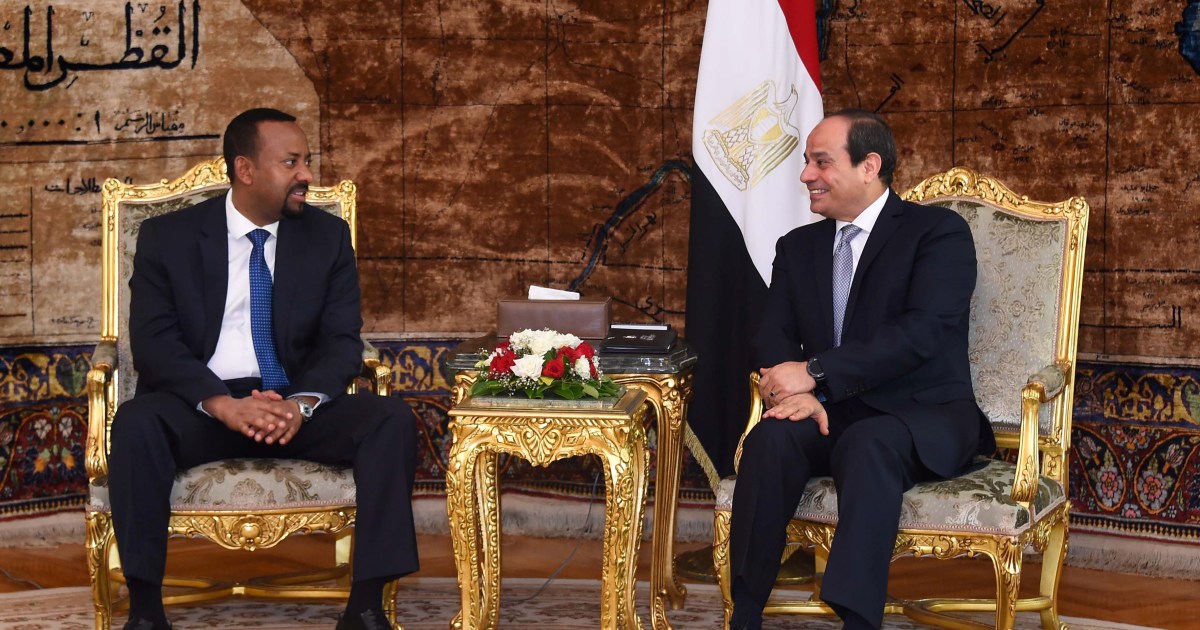An African diplomatic source told Al-Jazeera that a final agreement will be signed during the African mini-summit to be held tomorrow, on the Ethiopian Renaissance Dam, while official authorities in Sudan have provided explanations for the cause of the sudden decline in the waters of the Nile and its tributaries.
The summit - which will be held remotely - will be attended by Egyptian President Abdel-Fattah El-Sisi, Sudanese Prime Minister Abdullah Hamdock, Ethiopia Abi Ahmed, and chaired by South Africa, which holds the presidency of the African Union.
The diplomatic source stated in statements to Al-Jazeera that the African mediation had contacted the leaders of Egypt, Sudan and Ethiopia, and that the observer group - which includes the European Union and the United States - participated in the draft agreement, which will be signed as a compromise proposal in the legal and technical track.
The diplomatic source indicated that the observer team would be a guarantor of the agreement between the three parties.
The Renaissance Dam has been a source of tension in the Nile River Basin between the three countries since Ethiopia began building it in 2011, and it is the largest hydroelectric dam in the African continent. Egypt and Sudan see it as a threat to their vital water supplies, while Ethiopia sees it as a necessity for development and doubling its electricity production.
The irrigation ministers in Sudan, Ethiopia and Egypt ended the two meetings via video technology, which they had resumed on July 3, without reaching an agreement on the filling and operation of the dam, which are African-sponsored negotiations. Addis Ababa is committed to filling and operating the dam this month. While Egypt and Sudan reject this move before a tripartite agreement is reached.
Controversial issues
The African mini-summit will discuss contentious issues regarding the Renaissance Dam, most notably addressing the effects of the short, medium and long droughts during the filling and operation of the dam, the extent of binding agreements to be reached between the three countries, and how to settle disputes if they arise over the agreements.
A Sudanese government source told Al-Jazeera - earlier - that Khartoum and Cairo adhere to the necessity of what is agreed upon, and subject the differences that may appear to a specific reference, and the source added that Ethiopia accepts negotiations as a reference to resolve the differences.
Historical testimony of the most important water security scientists and energy economies in the United States about the # Ethiopian Renaissance Dam before a closed session of the House, Senate, and Americans. Paul Sullivan lived in Egypt and Africa and is a senior academic member of the US National Defense University faculty, excerpts from his speech in this series ... pic.twitter.com/4bpuM8bym1
- Mohamed Moawad (@moawady) July 19, 2020
Officials of the three countries failed in previous negotiating rounds to reach an agreement, especially on the mechanism of filling and operating the dam reservoir in a way that does not harm the shares of the downstream countries, and Egypt and Ethiopia exchanged accusations of intransigence and seeking to thwart the negotiations.
The Arab League, Egypt and Sudan have urged Ethiopia to postpone its plans to fill the dam's reservoir this month until a comprehensive agreement is reached, but Ethiopia said it intends to fill the dam according to its plan this month, which is the middle of the monsoon season in the country, without announcing a specific date for that.
Stations
in Khartoum In a related context, a Sudanese official source told Al-Jazeera that the sudden shortage of drinking water purification plants in Khartoum State is due to the decrease in the water coming from the white and blue niles during the current July, which occurs for the first time.
The Sudanese official added that the authorities based on these stations had to connect additional pipes to be able to reach the water after its continuous recession.
The Sudanese Ministry of Irrigation confirmed that some water stations in Khartoum were temporarily suspended from service, and attributed this to factors that said that the Renaissance Dam was not the most important.

